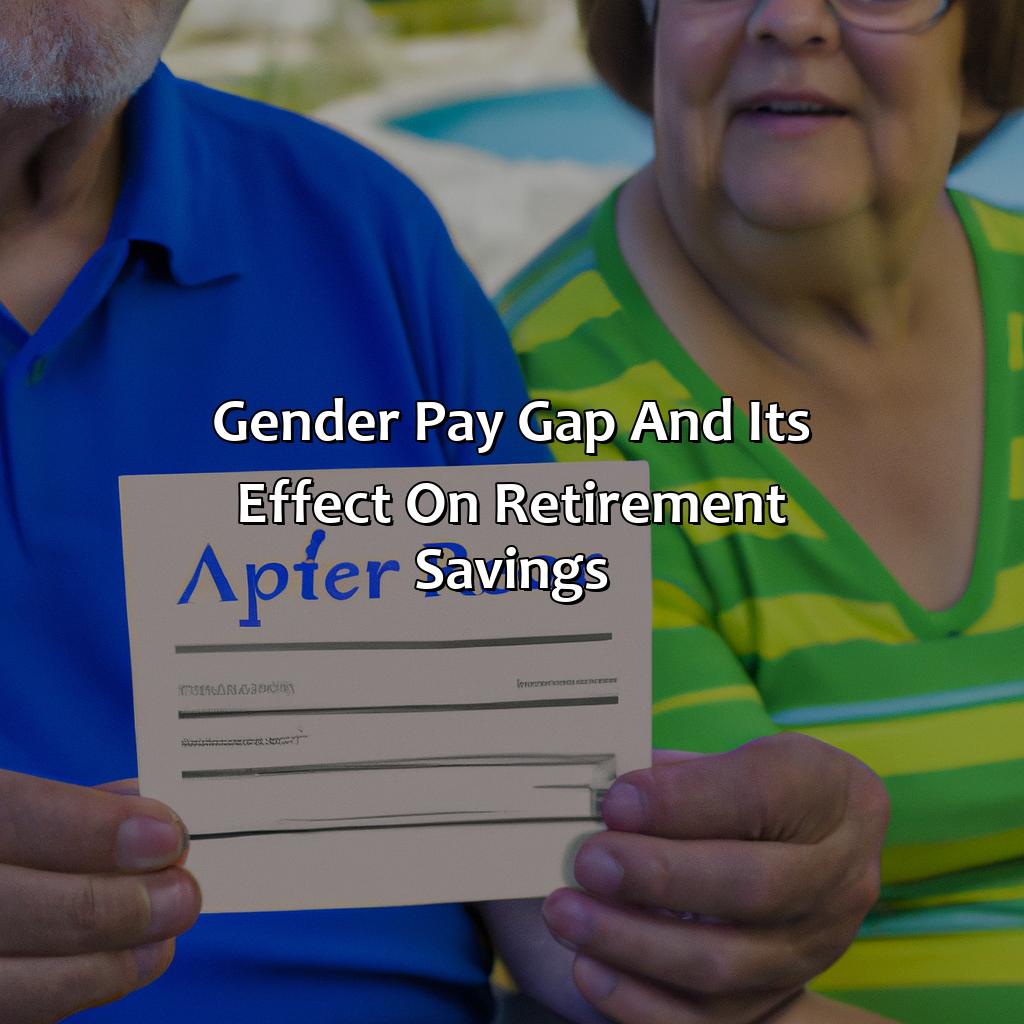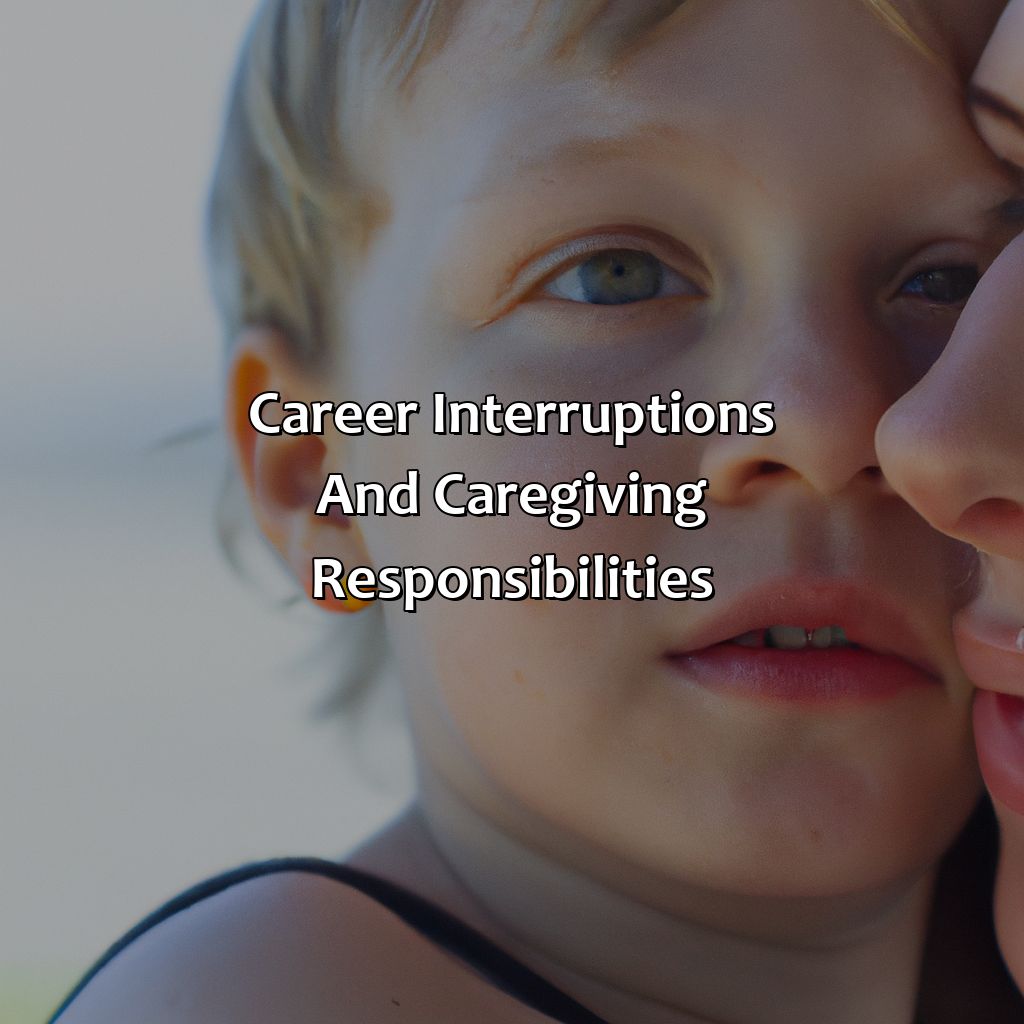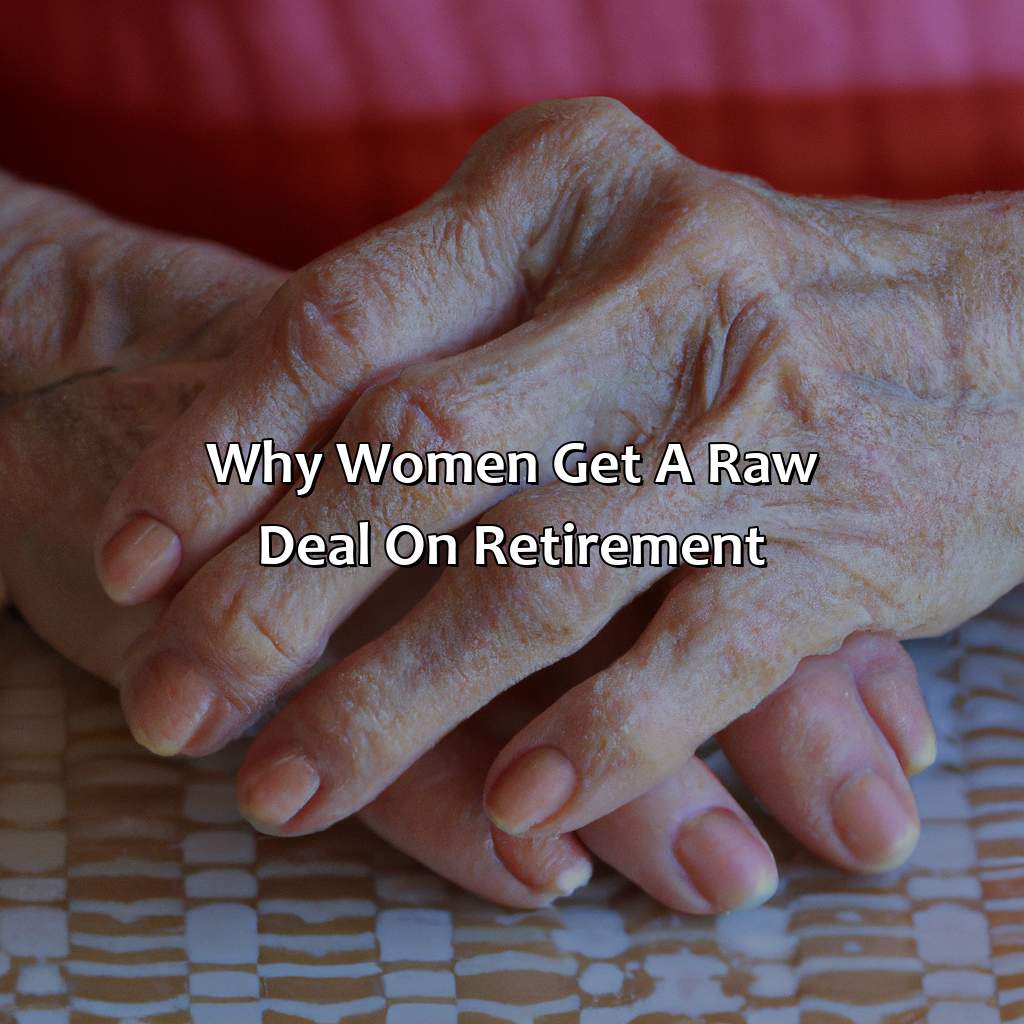Why Women Get A Raw Deal On Retirement?
Key Takeaway:
- The gender pay gap contributes to women having lower retirement savings: Women earn less on average than men, and this income disparity affects their ability to save for retirement, resulting in them having less money to live on in their later years.
- Career interruptions and caregiving responsibilities also impact women’s retirement savings: Women are more likely to take time off work for childcare or eldercare, which can reduce their earning potential and ability to save for retirement. Additionally, lack of supportive workplace policies for caregivers makes it even more difficult for women to reconcile work and family responsibilities.
- Women face unique retirement challenges like longevity risk and higher healthcare costs: Women live longer than men on average, which means they have to save more money to sustain themselves in retirement. Moreover, women also tend to have higher healthcare costs in retirement, making it critical for them to start saving early and investing wisely to prepare for these costs.
Are you a woman concerned about retirement? You’re not alone. Women, on average, earn less than men, yet are more likely to live to an older age. This article explores why women get a raw deal on retirement.
Gender pay gap and its effect on retirement savings
Understand the gender pay gap’s effect on retirement funds? Consider the impact. Women usually make less pay than men, impacting their savings. We’ll analyze how lower pay impacts women’s retirement funds. Also, we’ll talk about the struggles women have in gaining financial stability for the future.

Image credits: retiregenz.com by Adam Duncun
Women’s lower average pay compared to men
The discrepancy between the average pay of men and women is a well-known phenomenon. Despite performing the same job, women often get paid less. This leads to lower earnings over their working lives, resulting in decreased savings for retirement.
Furthermore, various factors contribute to gender pay inequality, such as occupational segregation, motherhood penalties and unconscious bias. Peer-reviewed studies have found that women retire with nearly one-third lesser pensions than their male counterparts, due to reasons mentioned earlier.
Research recommends adopting flexible work arrangements that allow mothers to combine work with caring responsibilities. Measures like implementing diversity programmes and scrutinising job descriptions can help eradicate gender bias from recruitment and hire processes.
Adopting measures that promote equal pay for men and women throughout their working years is crucial if we are to rectify the growing gap in retirement savings between genders. Although progress has been made in many countries around the world on this issue, much more still needs to be done.
Women are already juggling multiple roles and now they have to add financial acrobatics to the mix just to save for retirement.
How this impacts their ability to save for retirement
The gender pay gap has crucial implications for women who are looking to save for retirement. It can significantly impact their ability to accumulate sufficient savings and assets needed for a comfortable post-retirement life. According to studies, women are frequently paid less than men, so they usually have lower retirement benefits. This disadvantage puts them at higher risk of facing economic insecurity and financial instability in old age.
This inequality has a cumulative effect over time as women may also take career breaks or reduce working hours due to family responsibilities. This leads to a reduction in their overall earnings, which ultimately impacts their retirement savings even more significantly. Moreover, Women generally live longer than men on average; thus, the money they save must last longer.
Furthermore, Women need investment advice that factors in their specific circumstances while accounting for the pay gap and consequent retirement shortfall they face. They must advocate for equitable policies with employers and lawmakers to bridge this income disparity gap.
Overall, this issue is not only limited to women but also has dire consequences on families and society as a whole. A collective effort is required to address this issue of income disparity not only regarding retirement but also throughout a woman’s entire career span. Women should be empowered with knowledge and tools necessary for more informed decision-making concerning saving for retirement.
Women cannot afford to miss out on saving opportunities since even a small amount saved young could grow into significant wealth later in life when accompanied by good investment planning. Therefore, it is imperative that everyone takes note of the gender pay gap’s effect on women’s retirement savings so that efforts are made by both government institutions and private organizations alike towards resolving it as soon as possible before it’s too late!
Who needs a retirement savings plan when you can just live off the guilt-trips from your adult children for needing to take time off work to take care of them?
Career interruptions and caregiving responsibilities
To comprehend the problems experienced by women in retirement, we need to investigate the repercussion of career disruptions and caregiving duties. In this part on “Career disruptions and caregiving duties,” we will inspect the consequences of taking a break from work for childcare or eldercare. Plus, we’ll look into the deficiency of helpful workplace regulations for caregivers.

Image credits: retiregenz.com by Yuval Woodhock
The effects of taking time off work for childcare or eldercare
Taking time off work for caring responsibilities, such as childcare or eldercare, can significantly hinder the retirement prospects of women. This is due to the effects of career interruptions on opportunities for financial security and job advancement. These interruptions can limit earnings potential, pension contributions and overall savings, leading to a greater risk of poverty in later life.
Furthermore, this issue is compounded by the fact that women are often primarily responsible for caregiving duties. Not only do they face higher rates of workplace discrimination and lower pay than men, but they also take more time off work to care for family members. These factors result in a significant gender pay gap in retirement income.
It’s important to address this issue and take action towards building a fairer retirement system for all. Employers can offer flexible working arrangements and paid leave for caregiving responsibilities. Governments should also provide better support systems such as affordable childcare and social care services.
Failure to address these concerns will lead to future generations of women at risk of falling into poverty in their later years – something no one wants to miss out on – making it crucial that steps are taken now to ensure women receive equal opportunities when it comes to planning and preparing for their retirement.
Workplace policies for caregivers are about as common as unicorns in the wild.
Lack of supportive workplace policies for caregivers
The lack of caregiver-friendly workplace policies results in women receiving a raw deal on retirement. These policies do not account for career interruptions, leaving caregivers with insufficient social security benefits and savings. Such issues further perpetuate the earnings gap between men and women, as low-income women typically face more caregiving responsibilities.
As a result, women experience financial insecurity during their retirement years, which can lead to hardship and poverty. The emotional toll on caregivers is immense, impacting both their mental and physical wellbeing. Women are forced to choose between taking care of their loved ones or receiving a fair wage for their work.
Implementing supportive workplace policies that cater to caregivers’ needs is crucial in addressing the gender pay gap issue. Policies such as flexible work schedules, extended parental leave, and on-site daycare facilities would help reduce the burden on caregivers, enabling them to make informed decisions about their careers while providing quality care for their families.
We must acknowledge the impact that caregiving has on women’s financial stability during retirement and act now to prevent women from missing out on an enjoyable life post-retirement. This requires immediate action from policymakers in creating an environment where female workers can thrive while balancing personal responsibilities at home.
Don’t worry about longevity risk and healthcare costs, just pick a career with a pension plan that covers resurrection.
Longevity risk and healthcare costs
To tackle the issues of long life and costly health care during retirement planning for women, there are two important things to consider – longer living and more expensive healthcare. You can make a difference by starting to save early and investing carefully.

Image credits: retiregenz.com by David Duncun
Women’s longer life expectancy and higher healthcare costs in retirement
The association between women’s life expectancy and healthcare costs is undeniable. Women tend to outlive men by a few years, which results in higher healthcare expenses for them, especially during retirement. This has been a significant challenge because retirement savings do not always synchronize with the growing health needs later in life. Such longevity risk invariably leads to women receiving a raw deal on retirement.
Studies have shown that women face steep medical bills mainly due to gender-specific conditions like pregnancy and childbirth, reproductive cancers such as ovarian and breast cancer, osteoporosis, and urinary tract infections. These expenses can be high, recurring, and unpredictable at times; they are not limited to just meeting core living requirements like food and housing. Moreover, given the existing gender pay gap throughout their lifetimes, many women often lack sufficient funds or savings for post-retirement healthcare.
On top of everything else that females face when planning for retirement, there has been rampant historic discrimination based on innate characteristics like sex or race that have harmed many economically vulnerable groups- make it harder for them to amass wealth over their lifetimes through lower income levels or reduced access to education/credit/market opportunities.
There exists a true history where the U.K.-based insurance company Prudential conducted research in 2017 stating that women need an extra £183k (almost USD 252k) in savings compared to men when preparing themselves for later life expenses due to how much longer they live. If left unaddressed; this disparity will only continue hampering the efforts towards achieving a secure financial future for everyone.
Ways to address these challenges, such as saving early and investing wisely
Saving and investing early can help mitigate the challenges of longevity risk and high healthcare costs associated with retirement. Here are some effective ways to address these issues:
- Start saving as early as possible
- Maximize contributions to retirement accounts such as 401(k) and IRA
- Diversify investments through mutual funds, stocks, bonds, etc.
- Consider annuities to guarantee steady income in later years
- Stay informed about financial planning options and seek professional advice if needed
It is important to note that women tend to face unique challenges in retirement planning due to factors such as longer life expectancy, career interruptions for caregiving responsibilities, and lower lifetime earnings.
To overcome these challenges, it may be necessary for women to take additional steps such as seeking higher-paying jobs, negotiating for better salaries and benefits, creating a comprehensive financial plan that includes long-term care insurance, and considering investing more aggressively.
Overall, by taking proactive measures such as saving early, diversifying investments, staying informed about retirement planning options, and addressing gender-specific challenges head-on, individuals can better prepare for a financially secure retirement.
Why Women Get a Raw Deal on Retirement:
- ✅ Women generally earn less than men throughout their working lives, which results in lower retirement benefits. (Source: National Institute on Retirement Security)
- ✅ Women tend to take on caregiving responsibilities for family members, which can result in interrupted careers and fewer years of paying into a retirement plan. (Source: Forbes)
- ✅ Women often work part-time jobs or in industries that don’t provide retirement benefits. (Source: CNBC)
- ✅ Women live longer than men, which means they require more retirement savings to cover their longer lifespan. (Source: Vanguard)
- ✅ Women are less likely to invest in the stock market, which can result in lower returns on their retirement savings. (Source: CNBC)
FAQs about Why Women Get A Raw Deal On Retirement?
Why do women get a raw deal on retirement?
Women get a raw deal on retirement due to several factors such as the gender pay gap, career breaks, working part-time, and longer life expectancy.
Is the gender pay gap the main reason why women get a raw deal on retirement?
The gender pay gap is one of the reasons why women get a raw deal on retirement, as it leads to lower lifetime earnings and reduced retirement savings.
How do career breaks impact women’s retirement savings?
Career breaks, such as taking time off to care for children or elderly relatives, can lead to reduced retirement savings due to lower earnings and missed pension contributions.
Why does working part-time affect women’s retirement?
Working part-time often means lower earnings, resulting in reduced retirement savings, as well as lower eligibility for employee benefits such as pensions.
What is the impact of longer life expectancy on women’s retirement?
Women generally live longer than men, which means they may need to save more for retirement to cover their longer retirement period and potential healthcare costs.
What can be done to ensure women get a fair deal on retirement?
To ensure women get a fair deal on retirement, policies such as pay equity, paid parental leave, and flexible work arrangements can help close the gender pay gap and reduce the impact of career breaks and part-time work on retirement savings. Additionally, financial education and retirement planning tools can help women better prepare for retirement.




